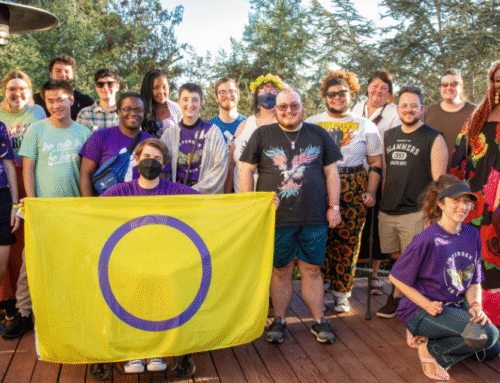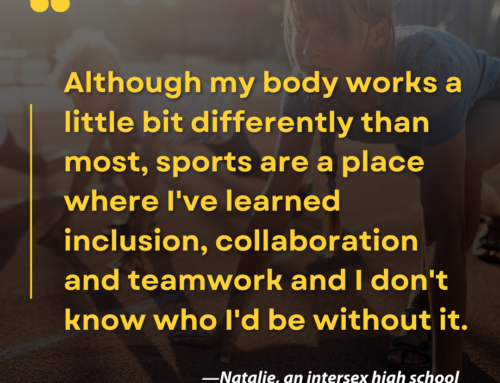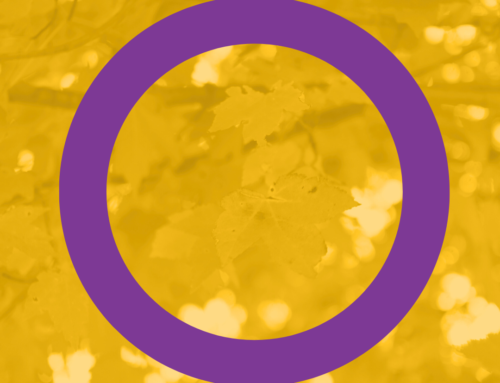By Apollo Robert
International Men’s Day has been celebrated on November 19th for 25 years, and its purpose is to highlight the issues impacting men such as promoting positive role models, health, well-being, and healthy gender relations. Every year, there is a specific theme highlighted for particular emphasis. For 2024, one of several themes is “Men’s Health Champions“, which is meant to “spotlight problems of men’s health and the people delivering the solutions”.
For those in the intersex community, many have specialized healthcare needs, especially if individuals have undergone unnecessary medical procedures in their youth, and intersex men or masculine people are no exception. There is often little visibility for this group within the community when it comes to intersex-specific healthcare, research, and psychosocial support systems. As a result, many intersex men and masculine people can feel isolated.
I am an intersex trans man who chose masculinity—through social, medical, and legal transitioning—because I saw how it could be regal, even beautiful, through celebrity figures like David Bowie. After I realized that I wanted it more than anything else in the world, I made that leap effortlessly. The early, innate resilience I developed about my body defying gender and sex norms helped that choice feel all the more blissful and liberating.
With this perspective in mind, I wanted to explore the other experiences of intersex men and mascs (masculine people.) So, for International Men’s Day, I hope these 9 stories highlight the diversity of intersex men and mascs, and offer inspirations of masculinity.
How has being intersex influenced, or not influenced, your experiences of being a man or being masculine? Are there any other aspects of your identity that have overlapping impacts?
Will:
Being intersex made it hard for me to accept my masculine identity. The “biologically male” elements of my body were used to demean me when I played with feminine elements of gender expression. It took a very long time to accept myself as a man but now I feel comfortable in this identity while playing around with feminine gender expression. Dresses, jewelry and makeup all feel more empowering to me than ever.
Shaggy-Mane:
I think being intersex has somewhat influenced my experiences as a man. I’d say I’m a pretty typical cisgender guy, but I definitely have had some experiences that might be considered non-conventional. My intersex variation caused some confusion around my gender, so part of my childhood I lived as a girl, and part of my childhood I lived as a boy. As a kid, I didn’t really conceptualize the clothes I wore or my mannerisms as an indicator of my gender, I just did what I liked. As I grew older and settled into my body and identity as a man, I recognized the way that these experiences shaped my ideas of femininity and masculinity. I wouldn’t say I’m particularly feminine, but I do feel able to express myself in ways that might be considered feminine or “un-manly”. I don’t feel like there’s one way to “be a man”, no two people are alike, thus no two men are alike, and there is so much beauty in that diversity.
Matty:
I think my experience with being intersex has made me feel less like a man. And more just a little masculine. I still have feminine features. And without medical treatment, I can’t get the manly features that I want. The last time I sought treatment, I was told the process would sterilize me. So I have this very uncomfortable feeling when called a man, because in order to be the man that I would want to be, I would have to medically augment myself to get there. And it’s hard to talk about that with people, I feel like most people outside of the intersex and trans communities just don’t understand that feeling. So on the positive side of things, I’ve just tried to embrace being intersex and maintaining the masculinity that I do have. Trying to embrace my differences.
Aibul:
Sometimes I both feel like I’m transitioning from “female” to “male” and “male” to “female”, simultaneously. There were times as a child when I couldn’t tell what sex I was. Depending on what aspects of my life I choose to describe, people can get wildly different ideas about what kind of person I am or could be. I used to strongly assert being either of the two binary genders, but don’t anymore. Understanding my body gave me insight I don’t think I’d have otherwise, like a missing piece of the puzzle. My proximity to “maleness” was what tripped me up when I was younger, and that was the sex I was predicted to be before I was born.
Evergreen Forest:
Knowledge of my intersex status is very recent compared to knowledge of my transness, so it hasn’t had a long time to sink in, but as soon as I heard my variation “counts” as intersex, everything clicked. “Oh.” I thought. “I’m intersex. That’s what I’ve been missing.” It was like a “duh” moment looking back. I had already been struggling with gender and also questioning if I was intersex for months leading up to this realization, so a lot of the weight of “why do I feel so inherently different from everyone else?” was lifted off my shoulders and everything made sense all at once. I know not everyone’s gender is connected to their intersexuality, but mine definitely is.
Mango:
In my late teens, despite being raised as a girl, I finally received clarity on why I never went through female puberty. I waited in the doctor’s office for the explanation behind my cracking voice and the hair that was growing on my chest instead of breasts that I was expecting. I was worried I had a tumor. I was not expecting that it was because I had testicles, and everything I had assumed about myself up until that point was an illusion. A redo of a gender reveal party right as you’re going into university–prescribed by your own doctor–was not on my bucket list.
Those moments were hard, because I had to remind myself that I chose this, the way one chooses the red pill or blue pill in The Matrix. As a teen, I had been introduced to a forked road (a choice that honestly should not have been presented that way to an adolescent)— if I removed my testicles and took estrogen, I could continue to live like a girl. If I kept my testicles, I would eventually look like a man. To be completely honest, and perhaps this makes me seem like an extremely simple person, I chose to not get surgery because I was terrified of pain, and I got some shady vibes from the doctor. I did not feel like deep down, I had some sort of connection to being male— you know, that’s why I raise my eyebrows at the idea that manhood is an innate sense. It was years later that I really began to have a picture of who I was as a man, but in that moment, I was a teenager who made a split second decision that I wasn’t brave enough for surgery, but I was brave enough to plunge into the unknown.
Throughout the confusing and turbulent years after my diagnosis, I remember being strangely attached or concerned about my hair. It was the one thing I kept constant even as my body was changing in ways I could barely believe. Looking in the mirror and increasingly seeing the body of a young man often made me feel like I must be looking at someone else. The long hair helped me reassure myself that it really was me.
Ika:
Learning that I am intersex, and that my body isn’t a “defective female” body, gave me the freedom to explore my queer identity. I first began calling myself a boy at 10 years old, but I never felt comfortable with masculine roles or language. This is because I am not a boy, a man, or a male in the way that Western culture has defined these terms. I have discovered that I am fully comfortable with my feminine traits, and that my traits don’t have to exist on opposite ends of a gendered spectrum.
Victor:
Being intersex has had a huge impact on my life. Honestly, I wish I was born “normal”—just some regular guy who didn’t have to deal with all this. Sometimes I think it’d be easier to be that negative, stereotypical, dude than having to spend my whole life adapting, pretending, and lying to fit in.
Weirdly enough, switching from being raised as a woman to living as a man—changing my identity and all that—was probably the easiest part of the whole thing. As a woman, I dealt with the usual stuff: lower pay, people not taking me seriously, and feeling like I had to prove myself all the time. Now, as a man, it’s totally different. I can be direct, bossy even, and people actually listen. I can give other guys grief, and they take it. It’s wild how much easier that part is.
That said, being intersex makes it hard to feel like I truly belong anywhere. I don’t feel comfortable with the LGBTQ+ community—it feels too tied up in identity politics and games I just don’t want to play. But I do respect what they’ve done for equality and the space they’ve created for people who don’t fit the norm. I guess having lived on both sides of the gender divide has given me a unique perspective on things. But honestly, it doesn’t make me feel like I fit in either world.
Jay:
Being intersex definitely made me feel less like a man for a long time because that’s what I was told. I was told I should have surgeries because I needed them to have a real gender. I couldn’t just be intersex, and being intersex meant I could never be a real man (or woman, for that matter). Being intersex doesn’t really affect my experiences of being a man, but other people think there’s a connection and that resulted in some negative experiences.
What does healthcare look like for you as an intersex man or intersex masc?
Will:
Healthcare to me looks like HRT. No matter what gender I was to present myself as, HRT (be it estrogen or testosterone) was always in the equation. My body cannot function properly without artificial HRT and I feel very lucky and thankful to have this healthcare. I do however worry about the future of this care and my intersex siblings who also need this care for health reasons.
Shaggy-Mane:
The healthcare I’ve received regarding my intersex variation hasn’t been too great. Sometimes there’s confusion about my intersex variation from physicians, which can lead to certain healthcare needs not being addressed fully. Thankfully most things that are immediate issues are addressed (e.g. prostate infections and urinary issues that are more common with my variation), but certain things relating to my long term health are not.
Matty:
I live in a rural area so healthcare options are extremely limited. There is a huge lack of understanding regarding conditions under the intersex umbrella. When I am asked about my condition, I often get a feeling they don’t believe that it is real or I see their entire facial expression change as if something grossed them out or caused great suspicion. How am I supposed to feel about an appointment when I’ve just informed them of a genetic condition and they look at me like I’m an alien? For this reason, I often avoid new physicians for any issues that arise. I deal with a lot of hormone imbalances and abnormal cyclical changes, so I found that acupuncture helped extremely, and diet. I didn’t have much luck on the endocrinology side of things. When I tried testosterone therapy, it didn’t go over well at all. I lost a lot, and gained nothing but the knowledge of it not working.
I also feel like my diagnosis was not the greatest source of support. They were looking for a different genetic condition. Although I had very obvious signs of XXY, I was not in an area that was understanding of it or even knew it existed. So even the geneticist really didn’t know how to explain it to my mom and I. Well, it turns out at the time I was unknowingly dealing with issues from XXY. It took over a year of suffering from hormone imbalances to get to an endocrinologist, because there are so few in this area. I remember the first time I saw the imbalanced hormone levels, it was so far out of the range for males that it would’ve been normal to see in female menopause. So it was kind of tough to look back on my first meeting with a geneticist about XXY, who made XXY seem like nothing to consult for potential care over. Looking back, I wish they would’ve encouraged me to get an appointment with an endocrinologist or just referred me right away.
Aibul:
It’s not very good at this point in time and causes me a lot of difficulty because medical professionals don’t take my health concerns seriously, when these same concerns would immediately alarm them in a dyadic person. It’s an “oddity” to them that I have the same health concerns as a “male” person in the first place.
Evergreen Forest:
Oh, boy. It’s not been pretty. I won’t go into detail, but I’ve definitely endured pretty severe medical trauma due to my sex variant. I wish the healthcare world in general was more knowledgeable, respectful, and able to tell patients about how their variants might come with certain health issues… instead of the other way around.
Mango:
Sexism is pretty rampant in intersex care, and having been both a patient as well as working on the side of doctors you can see it in how they support their patients. If an intersex man says “I am on my period and it feels awful”, there’s really no support. There’s often negative reactions and an expression that a man should be ashamed of what he’s experiencing. Many doctors are blindsided, or they don’t know how to handle that situation other than by suggesting surgery. We’ve gotten really good at scaling back unnecessary surgeries for intersex women, such as the efforts to reduce the amount of gonadectomies performed on women with CAIS. But we haven’t had that same level of progress for intersex men.
The idea that one cannot live a fulfilling life as a man if the penis is too small, if testosterone is too low, and therefore they should just live as a woman, is a form of sexism that makes it difficult to feel any sense of confidence as a man, and also portrays womanhood as an “other” category for anyone who wasn’t good enough to be a man. These sentiments permeate healthcare–from decisions regarding sex assignment at birth, gonadectomies where the most commonly removed gonad are the testes, to even faces of the intersex movement that empower intersex women but often forget about intersex men.
Ika:
Healthcare for me as an intersex man means explaining that yes, I have a uterus, and no, I still cannot get a transvaginal ultrasound. I have to fight for my medical safety and access to both gender-inclusive and specialty gynecologists. I need my testosterone prescription because if my hormones fluctuate too much, I will seize. It means never using the term “intersex” directly with my doctors, because to them I’m just a transgender man who happens to have a “disorder of sexual development” that they need to treat. But, it makes it worth it when I do find affirming, inclusive, and accessible practitioners that are educated about sexual variations and open to hearing my concerns and hopes.
Victor:
I feel lucky to have found my current doctors. They’re actually humane—not in that “humane vet” kind of way, like dealing with an animal, but genuinely humane toward me as a person. That hasn’t always been the case, though. I’ve had some doctors who just weren’t nice at all, like they didn’t want to deal with me or my situation.
Overall, though, I think I’ve been really fortunate with the care I have now, especially when I hear some of the horror stories from other intersex people. It makes me appreciate how good I’ve got it.
Jay:
I spend a lot of time in healthcare settings because I have a spinal cord injury. I “don’t look intersex” as long as I have clothes on, so most of my providers now don’t even know about it. Since being an adult, I’ve mostly had good experiences with discussing it with doctors. I’ve had a couple of doctors encourage surgery now, but most of the time I have very affirming experiences. It’s light-years better than the healthcare I had as a child- I have doctors who competently manage my hormones so I can stay healthy, are more focused on consent (so I’m not having as many unnecessary exams), and don’t care about my genital differences.
I have hypogonadism so taking hormones is important for my health, and it’s even more important with an SCI because SCI makes your bones weaker. I’ve never had any issues with getting hormones, but I live in a blue city within a red state and I’m worried about restrictions on gender-affirming care. My hypogonadism caused weak bones before I took hormones, which contributed to getting my SCI, so I’m pretty afraid of losing access to hormones.
Are there men or masculine people in your life that have acted as a positive or inspirational role model for you? If not, who would that ideal man or masculine person be?
Will:
Two real male icons I have would have to be Hozier and Will Wood. These musicians both have a gentle masculinity that inspires me to not compromise on my identity for the sake of others and their expectations. Two fictional male icons I have would be Daniel Cain and Will Graham. These characters inspired my gender presentation in a more physical sense, they both dress in a very butch way which keeps from wearing the “Adam Sandler Special” every time I go outside, they also both have had mid length haircuts which inspired me to grow my hair out.
Shaggy-Mane:
I’d say my mentor has been a very positive influence for me. He’s encouraged me to embrace my body and identity as an intersex person, and has always been there for me. It can be incredibly important to have somebody who is a listening ear, somebody who can assure you that there is a light at the end of the tunnel.
Matty:
Freddie Mercury. I love the fashion style he had. Now and then, I find something at the thrift store that is bright and fun, and I figure out an outfit for it. His masculinity on stage was something that was a joy to witness. I don’t know much about his personal character and how he was as a person outside of his music. But I like to think that bright and fun colors and patterns can be masculine too. Same thing with dancing, I love to dance. And I think that’s another reason why I look up to the on the stage version of Freddie Mercury.
Aside from that, I would say my uncle was also a positive influence on me, on what it means to be masculine. He was a very lighthearted person, very kind, and supportive. He was always willing to lend an ear if someone needed to vent and he was very respectful to those around him regardless of their stature in life.
Aibul:
I struggle with comprehending the idea of a “role model”, maybe because of autism. I guess I tend to look for role models in fiction without realizing it. My partner is a person I admire for his commitment to be a masculine and caring person at the same time, without oppressing others.
Mango:
I think in terms of people in my life who have made me feel more confident in my masculinity and who are inspirations, it’s probably my best friend and my thesis advisor from university.
My best friend was someone who never saw me for my body or the confusion I harbored about my identity as a teenager. He saw me for my personality, as eccentric as it was, he knew me by my values. When there’s a lifetime of people labeling you by things you can’t help about yourself, things you were but didn’t choose to be, to be seen for the person beneath all that was endlessly refreshing. I think that was very healing for me, and created the foundation of resilience that allowed me to handle so much uncertainty about my own body. Knowing who I am beyond what I am helped me feel like whatever happened, however I changed, I would never lose track of myself.
The first conversation I had with my thesis advisor, we were talking about politics, and then somehow landed on the subject of masculinity. He asked me what being a man meant to me, in the modern age. I said that “being a man means being perceived as what society sees as a man. And I’m perceived that way because I have testicles”. But he challenged me to think about myself in ways beyond my organs, despite my skepticism that masculinity and femininity were nothing more than just stereotypes.
We watched the movie, Fight Club, together, and he asked me to think about my own definition of masculinity, separate from cultural norms. He was the one who introduced me to the idea about a crisis of masculinity, where increasingly diverse lives and cultures come together to challenge what we mean when we say “masculine”. I had pointed out to him that this was exactly why I ultimately left my own sense of manhood to the existence of my testicles. However, he told me that this was a chance to explore and define what manhood means to me— cultural definitions of masculinity shift from era to era, country to country, but a strong sense of who I am, what I value, what I believe in, will stay with me for the rest of my life. And that, he said, is masculinity— the things that drive you, the people you’d sacrifice for, the mark you leave on the world.
Victor:
It’s a shame my father didn’t get the chance to fully raise me as his son, but honestly, I think he’d be my role model either way. He was the one who noticed my interest in boyish things—playing rough, working with tools, messing around with cars, and all that. He encouraged it, and that’s always stuck with me. After changing my documents, it got just a little bit easier to be myself.
Jay:
I think the most impactful role models I’ve had are other intersex men. I never would have developed a positive relationship with being intersex without them.
Evergreen Forest:
My personal role models are men who are gentle, caring, able to show affection freely, protect their communities in productive and safe ways, and just keep their environment in mind. Masculinity should be a tool to have as a reason within yourself to be respectful and responsible towards everyone.
Is there anything else you want others to know about being a man or being masculine? It could be ideas for creating change, affirming words of encouragement, both, or something else!
Will:
Define masculinity to yourself. Do not let anyone stifle your identity and do not let yourself fall into sexist traps. Center women in your life and love them. Be emotional, be loud, be quiet, cry, yell, feel your emotions as they happen. Do not compromise on your identity for others, be your truest self and in this simple act alone you will become a masculine icon to many. You are loved.
Shaggy-Mane:
Random words of wisdom for intersex young men/masculine people:
When it comes to romantic relationships, don’t feel afraid to express your concerns or feelings with your partner. You don’t have to be stoic or un-feeling just because you are a man/masculine, you are allowed to be emotionally vulnerable.
There is nothing “wrong” with your body. Your body is different, but that doesn’t mean that your body is bad. It also doesn’t mean that you are somehow inherently unattractive or undesirable. I’ve personally struggled a lot with my own self image especially in romantic relationships. Even though previous partners have never perceived my body as all that unusual, I had a lot of internalized animosity towards my body. It took me a long time to realize that my perception of myself and my body was not a reflection of reality, but rather a product of my insecurities. Give yourself grace, and remember that we are our own worst critics.
Matty:
I wish more men would try to understand that it’s okay to be kind and respectful. None of those characteristics should ever be perceived as weak. In my mind, it’s the men who stand up to bullies and hate, men who respect peoples’ boundaries, who are kind, these are the men that are strong… These are tough guys.
Victor:
Giving advice to other intersex men isn’t exactly easy. If you’ve decided to live as a man, you’ve probably already figured out some things for yourself—like, for example, how much being female can suck in certain environments. In simple words, I’ve felt much more free as a man than I ever did as a woman. I think, me pretending to be female, deserved kind of maybe 5 Oscars for female acting and 10 Grammy awards for a female voice—I was tired of pretending. It was exhausting.
Aibul:
Never compare yourself to dyadic people. If you have doubts about your body, reach out to the intersex community. I can’t promise everyone will be understanding, but I met many, many people who suffered from alienation without knowing why, myself included. It’s not as rare as people say it is, so you, the reader, could also be intersex.
Evergreen Forest:
Remember not to believe the stereotypes, the stray comment sections on inflammatory YouTube videos, the online discourse posts, or anything else that makes you feel ashamed to be masculine. Gender is a powerful driving force, and it’s ok to be happy being yourself. It’s ok to be proud! Cis, trans, nonbinary, multigender, agender, gay, straight, a-spec, intersex, perisex, questioning, BIPOC, cultural labels, disabled and neurodivergent people: we all unite under our shared identity. All forms of healthy masculinity are beautiful, and so are you!
interACT believes every intersex person deserves justice, and that only through ending interphobic legislation and intersex medical harm can we find justice under the law. You can help create a different future for intersex youth by giving here.






